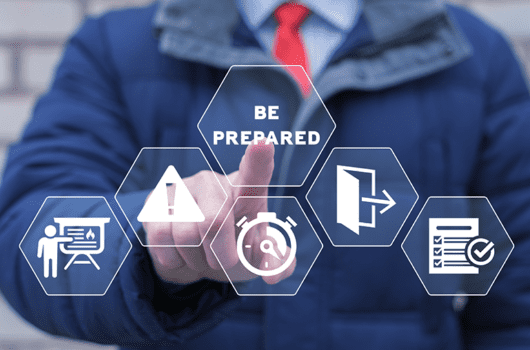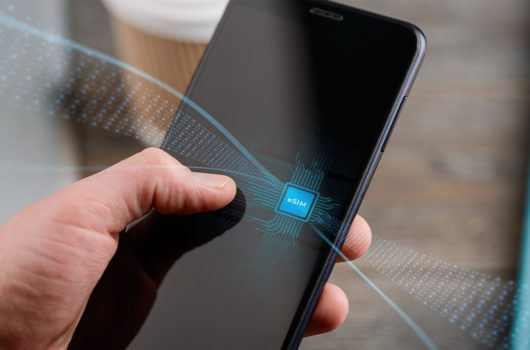As enterprises expand, so does their need for an unwavering network that supports every aspect of their business. From data transactions to customer communications, network reliability is a non-negotiable element of operational strategy. With the cost of network downtime extending beyond short-term disruption to impact productivity, profitability, and brand trust, the stakes have never been…

Powered by Bruin
-
Federal EIS Portal
Portal for federal employees and agencies with dashboard, invoice and inventory management, reports, help desk, ordering and more.
Sign in -
Bill Pay Portal
Customer billing portal to access and pay
Sign in
your MetTel invoice. -
Agent Portal
Sales information portal for agent
Sign in
partners.

Blog
-
-
Disasters or unforeseen crises pose a serious threat to business operations and can prevent organizations from meeting the needs of their customers and hitting their revenue targets, while also potentially causing damage to their brands. The best way to avoid being caught off guard and to enhance organizational resilience is to develop a business continuity…
-
Modern networks have come a long way from the traditional on-premise, single-location architectures. Today, businesses are getting into hybrid and cloud setups. These contemporary network models offer unparalleled flexibility, scalability, and cost-efficiency, enabling organizations to seamlessly integrate multiple locations, data centers, and cloud services into a cohesive and agile network infrastructure. Unfortunately, this poses a…
-
An Exploration of the Myths Surrounding POTS Replacement Continued Copper Retirement You probably know by now that Plain Old Telephone Service (POTS) is being phased out. The FCC initiated the phase-out of copper POTS lines due to their various disadvantages and challenges. This transition was propelled by regulatory changes, notably FCC Order 15-97, which allowed…
-
Government agencies know they need to move to SD-WAN (software-defined wide area network), but many are reluctant to take the leap. MPLS (multiprotocol label switching) is a proven technology and has been in place for 25 years, so moving away from it seems like a daunting task. MPLS is carrier-grade and reliable. However, it is…
-
Managing your network infrastructure can be challenging and resource-intensive. A managed network services provider simplifies these challenges by handling various aspects of your business’s network operations, from routine maintenance to advanced security. This enables your company to offload tasks such as network management, operations, upgrades, and troubleshooting to experts, while also ensuring that IT failures…
-
The Internet of Things (IoT) is at the heart of positive disruptions across all industries, and the transportation and logistics sector is no exception. This interconnected network of “things” includes devices, appliances, and other innovative technologies. Over time, it has emerged as a driving force behind major advancements, overcoming the many challenges companies in transport…
-
A Zero Trust Approach to Meet Today’s Network Security Demands Enterprises want to establish the highest level of network security while also giving employees the access they need to do their jobs. This is especially true with today’s remote and distributed workforces. In striving for this sweet spot, more organizations have been turning to a…
-
Why Companies Depend on Plain Old Telephone Services (POTS) First of all, what is POTS? Plain old telephone services, or POTS, have been around in some form since 1876. But by the mid-2010s, many businesses began taking steps to reduce dependency on POTS, partly due to the mass migration to VoIP and partly due to…
-
Hurricane Ian, a Category 5 Storm We have become accustomed to hearing about natural disasters on a regular basis. And some of us have had the unfortunate experience of living through one or more of these events. The pace and magnitude at which we’re experiencing natural disasters has caused many to become more vigilant about…
-
Some of the biggest and most expensive hacks of all time have targeted financial institutions. Equifax. Capital One. JP Morgan. All of these impacted millions of accounts and cost institutions billions in damages. Financial institutions will always be a target for hackers based on the sensitive nature of their data, making it imperative for these…
-
As remote and hybrid work continue to be the norm, employees are increasingly using their laptops and smartphones to communicate and work. This offers tremendous benefits in terms of flexibility and productivity, but it also introduces complex challenges in managing, supporting, and securing these devices. How do you ensure seamless connectivity, maintain cost-effectiveness, and support…
-
As the hospitality industry strives to continually enhance the guest experience, many companies have been embracing digital transformation. In addition to helping to create a pleasant and memorable guest experience, digital transformation brings with it other benefits, such as brand reinforcement, competitive advantage, efficiency, resilience, and cost savings. This blog post will discuss three specific…
-
Artificial intelligence (AI) is unquestionably the #1 technology topic in the world. In fact, nearly 50% of tech leaders polled by CNBC said AI is now their top expense. Whether large language models of generative AI like Chat GPT or Google Bard, machine learning applications like predictive analytics or intelligent automation tools, AI in all its…
-
The Internet of Things (IoT) is nothing short of revolutionary. Interconnected devices have opened up a whole new world of possibilities, from self-driving cars to connected buildings and homes. IoT has transformed the way work is done across all industries. In this blog post, we’ll explore how IoT is revolutionizing the manufacturing industry and discuss…
-
Our collective experience of going through the COVID-19 pandemic and the pace and magnitude at which we’re experiencing or hearing about natural disasters have caused many to become more vigilant about disaster preparedness. Many are asking themselves, What is my disaster plan for my family, myself, my community, my company? A key component of a…
-
Blockbuster is one of the greatest cautionary tales in business history. The downfall of this leading video store chain is a lesson on what happens when a company doesn’t evolve. Why? Because there will always be someone else who will use technology to its full advantage and deliver a better experience. In Blockbuster’s case, Netflix…
-
The Internet of Things (IoT) is helping to drive the next phase of digital transformation. It has great potential to redefine how we live and work. From streamlining operations in industries to providing unprecedented convenience in homes, the applications of IoT are vast and transformative. However, realizing the benefits of this technological wave is not…
-
Any savvy business leader knows that network and security go hand-in-hand. However, it’s getting harder than ever to shield modern businesses from evolving cyber threats and ever-increasing data breaches. In fact, Cybersecurity Ventures predicts that the damage from hacks and breaches will hit $10.5 trillion annually by 2025. Add to that the fact that networks…
-
The retail industry poses significant challenges, stemming not only from the ever-changing technology landscape but also from formidable competitors like Amazon and macro-level obstacles such as the Covid-19 pandemic. These unpredictable hurdles will endure, emphasizing the imperative for retailers to be adaptable in their approach. For small businesses, we can see these challenges reflected in…
-
Wireline Decommissioning & POTS Replacement – Current State About 10 years ago I asked my parents to upgrade their internet service from DSL to the local carrier fiber-based service. My mom was all in because it meant better video calls with her grandkids. My dad was dubious. He was concerned because he heard that once…
-
The many benefits of IoT in healthcare extend to patients, practitioners, healthcare enterprises, and affiliate industry components like cybersecurity companies and insurance underwriters. But what do these IoT telehealth solutions look like in the real world? Let’s look at some of the ways IoT in healthcare is transforming the telehealth landscape. 1. Remote Patient Monitoring…
-
As urban areas continue to evolve and adapt to the demands of a rapidly changing world, the concept of smart cities has emerged as a transformative force. With the integration of advanced technologies and data-driven solutions, there is an opportunity for cities to become more efficient and sustainable than ever before. In this blog post,…
-
Extra Space Storage Modernizes Their Network As local exchange carriers are decommissioning service and raising rates for local telephone service, organizations are feeling pressure to move away from copper / POTS (Plain Old Telephone Service) voice infrastructure and support. Extra Space Storage (NYSE: EXR) felt this pressure and turned the retirement of their copper wire…
-
MetTel’s Single SIM Can Change the Way You Work In today’s increasingly mobile and interconnected world, managing a mobile workforce presents unique challenges. Organizations often struggle to provide consistent connectivity for their employees, leading to decreased productivity and hindered data collection. However, a solution has emerged that tackles these obstacles head-on: the multi-carrier Single SIM….
-
Each year, people’s lives become increasingly connected. Digital assistants, smart homes and the like were only possible in the realm of science fiction not too long ago. Consumers are starting to see the Internet of Things (IoT) expanding into more and more aspects of their daily lives. It is fair to say that the IoT…
-
Driven by the COVID-19 pandemic, the business landscape has experienced a drastic shakeup, with a shift toward remote and hybrid environments that has changed how we work. Did you know that 12% of the workforce works fully remotely, while 28% operate in hybrid environments? These new working patterns come with benefits like more freedom and…
-
We recently held our 2023 MetTel Innovation Summit at the JW Mariott Resort in San Antonio. The 9th edition was our biggest and best yet (like everything else in Texas)! It was great to see so many familiar faces in person as well as a number of first-time attendees and special guests. As always, our…
-
As remote enterprise branch locations digitally transform, requiring more bandwidth, SD-WAN sets the stage for mass adoption of space-based comms.
-
If there’s one word that could sum up how business leaders are feeling about this year it would have to be “uncertainty.” Business leaders are looking at a landscape with tremendous risk, including inflation, cybersecurity, shifting geopolitical dynamics and the looming threat of recession. But each new challenge also presents an opportunity for growth, with…
-
Something big is happening in the world of IT communications. Over the past few years, quietly and discreetly, the world’s biggest telecom providers have been retiring their physical copper lines to fully digitalize their plain old telephone service (POTS). This digital transformation is better for telecommunications carriers/network providers and businesses alike, as copper networks are…
-
When you use your bank’s credit or debit card to buy goods or services, chances are, FIS is processing the payment. As the largest financial institution core processor and biggest payment processor in the world, we manage over half the world’s overall wealth, work with 95 percent of the globe’s leading banks, and process $10…
-
The leading telecommunications industry advocacy group, INCOMPAS recently named its Board of Directors for 2023. I am delighted to be re-appointed to the INCOMPAS Executive Committee of its Board of Directors for another year. Congratulations to my fellow Executive Committee appointees: Michael B. Galvin (chair) of Granite Telecommunications, LLC; Kurt Van Wagenen of FirstLight Fiber; Brian…
-
We’re familiar with software as a service (SaaS), platform as a service (PaaS) and even infrastructure as a service (IaaS). So many “as-a-service” models now exist that some brands are consolidating them all into one offering: everything as a service (or XaaS). Of course, XaaS is far more than just thrusting all the various “as-a-service”…
-
Access to fast and affordable broadband is no longer a luxury; instead, it has become a necessity. Accelerated by the pandemic, the introduction of video conference platforms and remote or hybrid learning means that both businesses and consumers require more bandwidth than ever to work, learn or even stay in touch with loved ones. For…
-
Water is a necessity, not a commodity. That’s why, during the COVID-19 pandemic, business operations at Primo Water continued to flow. If anything, much of our activity was accelerated as demand for home delivery services increased. But we also needed to make sure our refill and exchange locations were constantly stocked, and that we were…
-
FIS is the largest financial institution core processor and biggest payment processor in the world. Whenever you swipe your credit card, all that information flows through FIS. We manage over half the world’s overall wealth, work with 95 percent of the globe’s leading banks, and process $10 trillion of transactions annually. That’s twice as much as our…
-
The pandemic has indelibly shaped the way we do business, and we may never go back to the way we functioned before it. As Michael Dell recently reasoned in an op-ed, we need to stop thinking about the future through the lens of a post-Covid world. This is no longer the new normal—it is now our…
-
Where can you get major telecom carriers, enterprise IT providers, cybersecurity experts and even global PR/marcom firms who are direct competitors to sit side by side in complementary, thoughtful discussions about the most impactful trends and technologies? And where will you find some of the world’s largest enterprises in financial services, retail, healthcare and industry…
-
Handling mobile device-as-a-service needs lets customers more quickly adapt in today’s flexible workplaces. Mobile devices have become an essential part of daily life and work, surpassing the desktop as the primary way that people now access the internet. Consider the following: As the number of mobile devices has grown, so has the need to effectively manage…
-
Carriers are ushering in the end of perhaps the most widely used technology of the past 20 years, which presents some unforeseen challenges for businesses. At the beginning of each year, technology industry leaders prognosticate about incredible things that new and emerging technologies are on the cusp of accomplishing. The reason for this forward-looking optimism…
-
Shortly after the world was brought to its knees by the Great Recession of 2008, the modern IT communications market started taking shape fueled largely by one of the greatest expansions of technology the world had seen. Everything from cloud, the explosion of mobile, the commoditization of data center hardware, and the emergence of software-defined…
-
As we turn the calendar page on 2021, what has been a challenging two years in the midst of the pandemic is finally giving way to hope and promise for the new year. As the pandemic greatly accelerated companies’ digital transformations and their use of innovative technologies, the new normal will see businesses needing to…
-
Straight to the Point is a new blog series by Zachary Grant, MetTel’s Vice President of Solution Architecture. Each article will break down the benefits and functionality of the latest communications technology in an easy-to-understand way that gets past the fluff and gets Straight to the Point. Zachary oversees a fleet of Senior Technology Architects…
-
It’s no surprise that the security threat landscape is rapidly becoming more sophisticated, as evidenced by the recent attacks involving Colonial Pipeline, Kaseya and SolarWinds. Considering the pace of digital transformation in today’s businesses, a single cyberattack can bring a company’s operations to a standstill. In June, FBI director Christopher Wray commented that the cyber…
-
Among the many factors that are driving more and more organizations to adopt IoT solutions for enterprises, “ease of deployment” might be the most important. Companies and businesses are looking for an easier route to IoT deployment that won’t bog them down with customized requirements and other professional service engagements that will slow them on…
-
As Microsoft Teams’ popularity increases, there’s still one feature companies were missing: external calling. Until now. The increase in remote work is driving people to Microsoft Teams Between April and October 2020, Microsoft grew from 75 million daily active users to 115 million daily active users. This 50% increase in users in just a few…
-
We see our flagship cellular-IoT product, Quest, as a way for orthopedics to digitally transform in a way that reduces waste, enhances patient safety, and ultimately delivers orthopedic distributors, manufacturers, and providers superior bottom-line performance. Vic Nunes, QMed CEO & Founder More than 7 million people require orthopedic surgery annually and the implant market is…
-
When you consider the fact that 89% of the U.S. population (and 68% of the world population) is projected to live in urban areas by the year 2050*, the need for smarter, more efficient technologies to help these areas manage city-wide operations is becoming more and more critical. There is a lot of talk right…
-
Since 2019, Rotech Healthcare, a national leader in providing ventilators, oxygen, sleep apnea treatment, wound care solutions, and home medical equipment, has been undergoing digital transformation (DX) to become completely paperless in order to improve operational efficiencies and service patients more effectively. We defined a roadmap and strategy for our digital transformation and executed that…
-
Nearly a decade ago, we recognized that a new software defined WAN would be an integral part of all our customers’ digital transformation journey. We worked closely with partners and customers to develop and refine our WAN capabilities, even prior to the now ubiquitous term “SD-WAN.” While many of the bigger players in the industry…
-
While we’ve all heard the hype about 5G for many years now, many businesses have yet to experience any benefits. So is 5G just another overhyped technology? The truth is, the promise of 5G is enormous, but all the benefits won’t be immediately realized today. Partners in the 5G revolution As the first step toward…
-
Smart city initiatives are a way for communities to respond to challenges of sustainability and efficiency. With the world’s population expected to reach 8.5 billion by 2030 and 60% of this population living in urban areas, cities are facing unprecedented pressures. Smart cities have implemented tech in innovative ways to overcome these challenges. 1. What…
-
Digital Transformation (DX) can be a loaded term; it means different things to different people. Even when you ask organizations that are measuring it what DX means, such as Gartner and IDC, you might get different definitions. However, no matter what our own definition is we can agree that we all share the same digital…
-
Max Silber VP of Mobility MetTel Over the past several years, the balance of power has shifted from the seller to the buyer as the digital consumer took to the Internet and took control of the transaction process. Armed with Apple’s iPhone.
-
Like many cities across the United States, the city of Phoenix is looking for ways to deliver efficient, cost-effective and safe public services. As the fifth largest city in the U.S., Phoenix is challenged with managing and conserving 270 million gallons of tap water and treating 135 million gallons of wastewater daily. Water is the…
Get fresh updates on email.
Subscribe to our newsletter for the latest MetTel news, articles, and resources—sent straight to your inbox every month.






































































